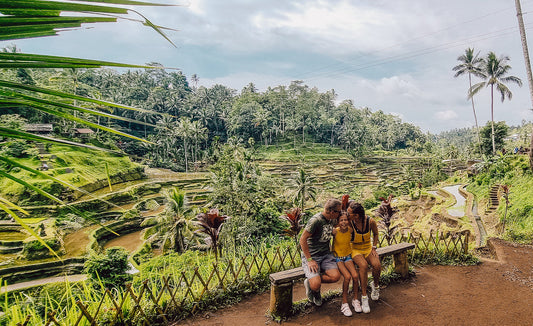
Summer Vacations 2020? Not only do we want to go on vacation this summer, but we REALLY need it. But where? We know what is allowed, but it seems that our options are so limited, either because we do not know which business is open, or what is left available.
The purpose of this section is not to explain to you the current rules issued by the government. I find that my fellow blogger Sophie from BB JetLag explains it all very well in this post. I also don’t think you need another guide outlining the tourist areas and their attractions. For example, the Quebec Holiday Guide is full of relevant information, no need to repeat everything here 😉
What I want to do with you today is to Offer you 17 essentials to know before booking anything. I want to go further than what is said in the newspapers and the web, say the real things, and be more imaginative to find you real simple solutions!
17 essentials to know before booking your summer vacations 2020
As of June 16, 2020, we know that the Canada-U.S. border will remain closed until July 21. Elsewhere in the world, many borders are open to tourists, mainly because the tourism industry accounts for a large part of the economies of these countries, not because the risk of transmission has decreased.
Here are some very important things to consider if you want to take your vacation in the U.S., Canada or any other country this summer.
Vacations and travels abroad in the summer of 2020
1. It’s highly probable that when we’ll arrive abroad, we may be forced to be quarantined. For example, the border in Hawaii has opened for visitors, but they must remain in quarantine, without being able to leave their hotel room once for 14 days! They have to have all their meals delivered to their rooms. Let’s hope the view from the balcony is breathtaking! If the visitor changes islands, he must start his quarantine again. Not necessarily interesting.
2. As of June 4, Maine requires visitors to be in voluntary quarantine for 14 days upon their arrival. The same goes for Massachusetts,and Vermont. Click here to see the details about other U.S. states.

3. If quarantine is not mandatory, it is very likely that when we arrive at our destination, we will be forced to take a screening test. Iceland, for example, offers to pay for the test, otherwise, we will have to pay for it. Vienna charges 190 € for 1 screening test.
4. In addition to the fees to be paid for this test, it will be necessary to plan the time to take the test, to get it analyzed, and for the results to be communicated to us. If we travel as a family, these delays may be different per person. In Hong Kong, for example, travelers arriving from abroad were taken to a huge empty warehouse, or bunker, and spent about 8 hours there, sitting in a wooden chair, until the whole process was over. Let’s ask ourselves if we want our vacation to start this way?
On June 5th, the UK government has announced they started testing for a new quick test that can have results processed on-site in 20 minutes, according to The Guardian. The test is done with a swab and the results do not need to be sent to a laboratory, which saves a lot of time. Stay tuned…
5. We must also think that there is a risk that we will catch the Covid-19 abroad, and we have no idea if we will be one of those who are asymptomatic. There is a probability that the virus will make us sick, maybe we will not be able to enjoy our vacation, or worse, have to receive care abroad and spend our holidays at the hospital,with the quality of care available at destination. Also to think about: if we are concerned about the language barrier in normal times, if we are hospitalized, this stress will probably be x1000.
6. Now, since the Canadian government officially recommends that non-essential travel abroad is to be avoided, this ensures that travel insurance policies do not cover the risks associated with Covid-19. I know, I know, we need to travel to preserve our mental health, but unfortunately, this is not yet recognized by the insurance companies lol. How much do you think it costs to be hospitalized because of the Covid-19? I’ve done some research, and it can cost between $34,000 and $73,000 USD. It would make it a very, very expensive holiday!

7. Very important too: there may be a second wave eventually. Therefore, if you buy airline tickets for later, look carefully at their refund policy in case you have to cancel your trip. And avoid FlightHub at all costs: even before the Covid-19, they did not refund airfares, and even charged additional fees to supposedly process flight cancellations. It’s a fact: they never reimbursed me for my 2019 flight, and we are in 2020. And they charged me an extra $300 to “process” my refund.
8. Finally, the Government of Canada imposes 14-day isolation when returning home. It is very likely that our employer will ask us to take these 14 days from our vacation bank. Not fun.
If we do a recap, for a 3-week trip abroad, if we take into account that we will be quarantined for 14 days at our destination, then another 14 days when returning home, it gives us a nice big 7 days of a real vacation. This makes it an expensive vacation.
Did you decide to fly anyway? I judge no one, don’t worry lol. Here are the essentials to know about your next flight!
9. If you decide to fly, experts suggest that you book short flights, to avoid having to use the lavatory, to reduce the chances of being infected by a sick person on board, and also to avoid the risk of blood clots (flying flights of 4 hours or more can be a risk factor for deep vein thrombosis and pulmonary embolism). On the other hand, ‘short flights’ means several flights and stopovers if you want to travel far away. An important question then to ask: how long should we plan for stopovers? Usually, 1 hour is a minimum, but if there will be additional checks, should we plan for 2 hours or 3 hours stopovers? It lengthens the travel time and the tiredness that comes with 😉
10. When it comes to seat selection, it is best to get the window seat. Why? If we calculate a 6-foot radius around us, having a wall next to us reduces the number of people who can contaminate us. Not to mention the people who will walk up and down the aisle.

11. Bring disinfecting wipes to clean your seat belt, tray, armrests, and personal belongings that may have touched a contaminated surface, such as your passport.
12. Also, bring reusable zipper bags for your belongings that other people may have touched. You can disinfect them later.
13. Wash your hands as often as you can,or disinfect them as often as possible with hydroalcoholic gel (like Purel).
14. And as soon as you’re sitting in your seat, try not to get up or walk around.
15. Wear a mask, but no gloves: wearing gloves can give a false sense of security.
16. Flying with children, especially young children, brings special considerations. It’s hard already for our kids to wash their hands often and avoid touching everything at home, it can be even more difficult on a plane. Please take note that children younger than 2 years old should not wear masks.
17. Finally, no matter where you travel, book your accommodation directly on the hotel’s website, so the hotel won’t have to pay a commission to a third party and will be more likely to stay in business longer 😉
Seriously, we want to travel abroad as badly as you do! But at what cost? I think a trip abroad, for now, would be possible, but a lot of things would make the experience very, very annoying!
Our best option: a local vacation
As of June 15, 2020, booked accommodation must be for up to 10 people, coming from no more than 3 families (Quebec’s law). Moreover, not all hotels are open, and for those who are, availability is quite limited.
Here are our favorite and best family hotels in the province of Quebec!
In the Quebec City area
Entourage sur-le-Lac
https://www.instagram.com/p/B0WumUBHNzF/
Hotel Le Bonne Entente
Hotel 71
In the Montreal area
Hotel the Crystal
https://www.instagram.com/p/B_5DHVwnX37/
Hotel St-Sulpice
https://www.instagram.com/p/B79cRGkH3Q8/
In the Saguenay-Lac-Saint-Jean region
Hotel Chicoutimi
Mon Adresse À Louer
https://www.instagram.com/p/CADi8xKHhkp/
These hotels have been tested by ourselves! But there are many other great options to discover! And don’t forget: to encourage the local economy as best you can book your accommodation directly on the hotel’s website (not Expedia, for example).
Have a great summer!




